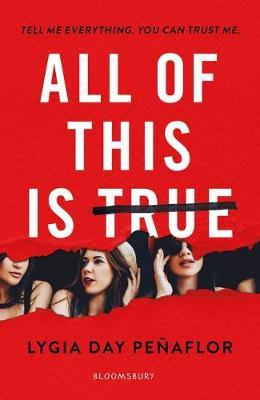All of this is true by Lygia Day Penaflor

Bloomsbury, 2018. ISBN 9781408890936
(Age: 15+) Unusually scripted, this novel is not constructed in the
common form of a novel related by a known or unknown narrator.
Daring to be quite different, this new form of storytelling is
constructed through the use of a various personal and written
interactions, using narrative accounts of experiences, scripted
interactions and television interviews. As we read the individual
'parts', we are challenged to build a story of the events, as we
understand them to have happened, and it is in our recognition of
what we gather that appears to be a valid account of the truth of
the events as we think they have occurred. We are certainly drawn
into the world of the text by what we realize as the wrongful use of
data, collected without the permission of the characters concerned.
Its 'story-telling' methods consist of television interviews of
people involved in the events, of other apparently on-line
interviews, of excerpts from a New York magazine, of one character's
story, and of passages from the novel that engendered the whole
'story' that we gather as it emerges. It is through these repeated
models that Penaflor chronicles events, past and present, to
construct her book. We construct our idea of the story, and indeed
of what we decide is 'truth' or 'lies', and indeed of the element of
'betrayal', by linking what we discover in the various models.
The novel begins with the script of a television interview and the
story evolves through each passage, as the novel segues between the
various models. The narrative is constructed through articles in the
New York City Magazine, interviews of characters involved in the
'story' by unrevealed interviewers, excerpts from a new book written
by this television interviewer, using, illegally, it is alleged, the
adolescents' opinions and stories, as gleaned from the TV 'chats'.
Added to this is the questioning of the young people involved by an
unnamed interviewer, through which we glean sufficient understanding
to create a 'story', As readers, we work to make sense of the
events, and thus we are drawn into the affront felt by the
characters, those emotional responses of those whose words, in
interviews, were used by the writer of the novel, without
permission, to construct her new novel.
Complex, challenging and emotive, this new work is powerful, set
absolutely in the world of modern media, both private and public,
and responding to the ideas of betrayal and loyalty, and of naivety.
Penaflor has created a 'text' that is very vibrant, and reflects
that part of life where adolescents must decide on their set of
values, of aspirations, of what matters in this world, of who they
are and what they will become, and most of all, what they will
value. This is appropriate for adolescents, and would be apt for
adults, especially those who work with young people.
Elizabeth Bondar